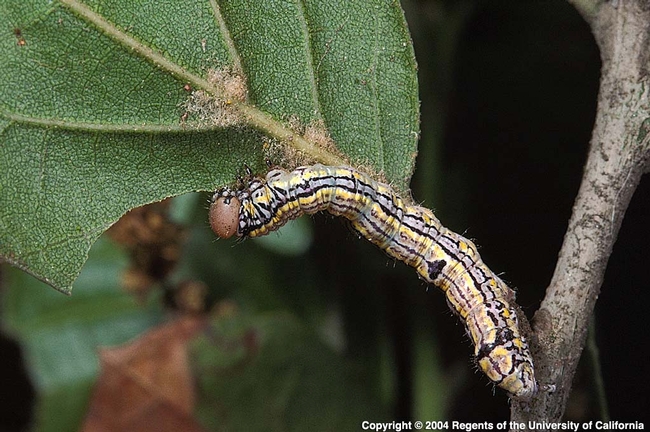I have caterpillars eating the leaves on my oak trees, what should I do?
Ann M. Arroyo Grande
The California oakworm is probably your pest. On a typical year, there may only be two generations of oakworms, but this year was unusually warm and dry in mid-winter, which has created a perfect environment in order to have a third generation. The life cycle of an oak moth starts with eggs, then maturing to a larva (caterpillar), eventually transforming into a chrysalis (pupa) then finally to the adult oak moth. The oakworm is a small light green caterpillar with a dark brown head and dark stripes on their sides. The oak moth may be spotted during the summer afternoons.
The California oakworm’s favorite food of choice is the coast live oak. Populations are unpredictable year to year, with outbreaks appearing occasionally followed by years of almost no damage to oak trees at all. Don't panic, healthy oaks will tolerate extensive loss of leaves without serious harm, so treatment to control oakworms usually is not recommended. In the past month, the Master Gardener helplines have received numerous reports that there is an abundance of oakworms in San Luis Obispo County. Pesticide sprays applied to control oakworms usually are not warranted to protect the health or survival of oak trees. If you believe your oak trees need protection because they are stressed, regularly check foliage for oakworms and spray least toxic pesticides only when caterpillars reach levels needing treatments. Control oakworm and protect oaks with an integrated pest management (IPM) program that relies primarily on the conservation of natural enemies and good cultural practices. Yellowjackets and garden spiders are good predators of oakworms. Providing a birdbath may help increase the amount of birds in your yard, which will help decrease numbers as well. A good resource for identifying and controlling the oakworms through the use of natural enemies is http:www.ipm.ucdavis.edu.
If you feel that your oak tree was weak or dying before the oakworm outbreak, you may want to consider the cultural care of your tree. Oaks do not need irrigation, unless supplementing during a time of winter drought. Is your tree affected by nearby lawns, compacted soil, damaged roots from construction or nearby pavement? UC ANR offers a free download of their publication "Living Among The Oaks" a guide to keeping your oak trees healthy so they can benefit generations to come.
Oakworm Problem this Year
Apr 26, 2012
Apr 26, 2012